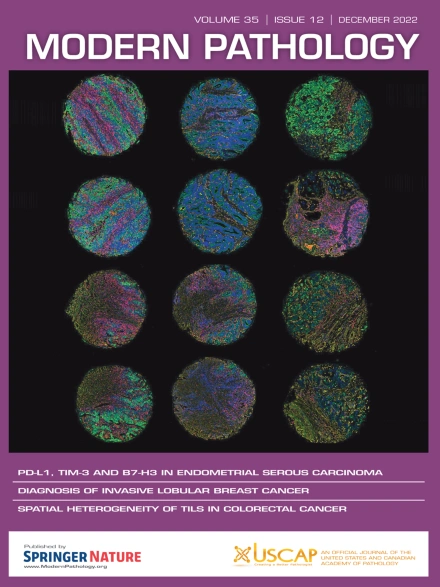IDH 突变前列腺腺癌的组织病理学和分子特征。
IF 7.1
1区 医学
Q1 PATHOLOGY
引用次数: 0
摘要
功能增益型异柠檬酸脱氢酶(IDH)突变在许多肿瘤类型中都具有重要的致病性,在胆管癌、低级别胶质瘤和急性髓性白血病中具有可操作性。前列腺腺癌(PCa)中也出现了罕见的 IDH 突变。最近有文献指出,PCa 中的炎性钙化与 IDH1 突变有关。在这项回顾性研究中,我们查询了本机构的临床测序数据库(队列 1)和之前在 cBioPortal 上发表的 PCa 数据集(队列 2)。样本按IDH1 R132和IDH2 R140/R172的致癌热点IDH突变以及其他非热点IDH突变进行了分层。在队列1的4033例PCa中,发现17例(0.4%)携带相互排斥的致癌热点IDH1(15例,其中1例为亚克隆)或IDH2(2例)突变,20例(0.5%)携带非热点IDH1/2突变。对13例IDH1热点突变病例的组织学检查和现有材料显示,病变为3级或3级以上。在可能的情况下,对有IDH1热点突变的病例进行了免疫组化,结果显示所有4例染色病例的AR、PSA、PSMA和NKX3.1均为阳性。在队列 2 中,从 2749 例患者中发现了 9 例(0.3%)携带 IDH1 热点突变的病例,另有 9 例携带 IDH1/2 非热点突变。23例IDH1热点突变的PCa患者中没有ETS融合、SPOP热点突变、BRCA1/2、ATM、RB1或AR的体细胞或种系改变;19例成功通过微卫星不稳定性(MSI)检测的病例均为微卫星稳定型。相反,在29例非热点IDH突变病例中,4例有TMPRSS2::ERG融合,6例有SPOP热点突变,10例有AR扩增/热点突变;8例为MSI-高。值得注意的是,只有两例IDH1热点突变病例出现了炎性钙化。我们的研究结果提供了证据,证明IDH1热点突变是这种罕见但独特的PCa分子亚群的驱动性改变。还需要进一步研究雄激素剥夺和IDH抑制剂的相关反应。本文章由计算机程序翻译,如有差异,请以英文原文为准。
Histopathologic and Molecular Characterization of IDH-Mutant Prostatic Adenocarcinoma
Gain-of-function isocitrate dehydrogenase (IDH) mutations are pathogenically significant in many tumor types and are actionable in cholangiocarcinoma, low-grade glioma, and acute myeloid leukemia. Rare IDH mutations have been described in prostatic adenocarcinoma (PCa). Recent publications have suggested that psammomatous calcifications in PCa are associated with IDH1 mutations. In this retrospective study, we queried our institutional clinical sequencing database (cohort 1), and previously published PCa data sets in cBioPortal (cohort 2). Samples were stratified based on oncogenic hotspot IDH mutations at IDH1 R132 and IDH2 R140/R172, and other nonhotspot IDH mutations. Seventeen (0.4%) cases were identified from 4033 PCa cases in cohort 1 harboring mutually exclusive oncogenic hotspot IDH1 (N = 15, 1 of which was subclonal) or IDH2 (N = 2) mutations, and 20 (0.5%) cases had nonhotspot IDH1/2 mutations. A histologic review of 13 cases with IDH1 hotspot mutations and available material showed grade group 3 or higher disease. Immunohistochemistry was performed on cases with IDH1 hotspot mutations when possible and showed AR, PSA, PSMA, and NKX3.1 positive in all the 4 cases stained. In cohort 2, 9 cases (0.3%) harboring IDH1 hotspot mutations were identified from 2749 patients, and 9 cases carried nonhotspot IDH1/2 mutations. The combined cohorts of 23 PCa cases with clonal IDH1 hotspot mutations had no ETS fusions, SPOP hotspot mutations, and somatic or germline alterations in BRCA1/2, ATM, RB1, or AR; 19 cases with successful microsatellite instability testing were all microsatellite stable. Conversely, among 29 cases with nonhotspot IDH mutations, there were 4 with TMPRSS2::ERG fusions, 6 with SPOP hotspot mutations, and 10 with AR amplifications/hotspot mutations; 8 were microsatellite instability high. Notably, two cases with IDH1 hotspot mutations had psammomatous calcifications. Our findings provide evidence that IDH1 hotspot mutations serve as driver alterations in this rare yet distinct molecular subset of PCa. Further studies are warranted to correlate response to androgen deprivation and IDH inhibitors.
求助全文
通过发布文献求助,成功后即可免费获取论文全文。
去求助
来源期刊

Modern Pathology
医学-病理学
CiteScore
14.30
自引率
2.70%
发文量
174
审稿时长
18 days
期刊介绍:
Modern Pathology, an international journal under the ownership of The United States & Canadian Academy of Pathology (USCAP), serves as an authoritative platform for publishing top-tier clinical and translational research studies in pathology.
Original manuscripts are the primary focus of Modern Pathology, complemented by impactful editorials, reviews, and practice guidelines covering all facets of precision diagnostics in human pathology. The journal's scope includes advancements in molecular diagnostics and genomic classifications of diseases, breakthroughs in immune-oncology, computational science, applied bioinformatics, and digital pathology.
 求助内容:
求助内容: 应助结果提醒方式:
应助结果提醒方式:


